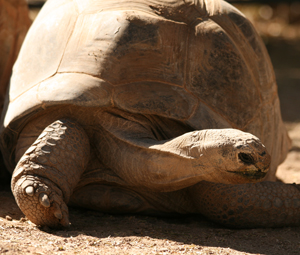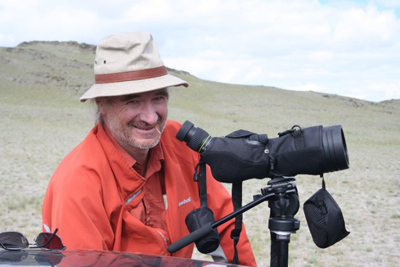News Detail

02/24/2015
Biologist James Gibbs’ volunteer work in the Galapagos Island some 30 years ago introduced him to the giant tortoises that would become the centerpiece of a remarkable research career.
Gibbs, professor of vertebrate conservation biology and associate chair of the Environmental and Forest Biology Department at SUNY College of Environmental Science and Forestry (ESF), will discuss the conservation of these gentle giants on Wednesday, Feb. 25.
His talk, titled “Integrating Science and Management to Advance Giant Tortoise Conservation in Galapagos, Ecuador,” will begin at 7 p.m. in Sperry Center, Room 105.
Gibbs’ lecture continues the 2014-15 Cultural and Intellectual Climate Committee (CICC) series, themed this year on “R/Evolution.” The presentations question the notion that evolution represents positive change and how timeless issues seem to reassert themselves in present times.
An international expert on conservation biology, Gibbs will explore the principles and concepts of evolutionary biology and their usefulness in conserving biological diversity using giant tortoises in Galapagos. The Galapagos Islands are located in the Pacific Ocean approximately 600 miles west of Ecuador, of which they are a part.
Gibbs directs the Roosevelt Wild Life Station, which was established by an act of the New York State Legislature in 1919 to memorialize Theodore Roosevelt as a wildlife conservationist. Its research program focuses on the northeastern United States and southeastern Canada, an area that is undergoing one of the most rapid rates of climate change in North America, as well as strategic sites around the globe.
Gibb’s love of nature stems from a childhood spent outdoors, exploring the woods of Maine.
As a youth, he volunteered in the Galapagos Islands.
“I fell in love with it,” he said. “I have worked hard ever since to play a role in Galapagos conservation. I am fascinated with tortoises — their longevity and hardiness but also their curiousness and wise nature.
 |
| James Gibbs, who will speak at SUNY Cortland on Feb. 25, is shown conducting fieldwork. |
“I also am extremely impressed with the Galapagos National Park Service and how hard it works to integrate the best science available with population and habitat management to advance its conservation mission. It’s a privilege to collaborate with them in their work.”
Gibbs has a bachelor’s degree from the University of Maine, a master’s from the University of Missouri and his doctoral degree from Yale University. At ESF, he teaches Conservation Biology, Problem-Solving in Conservation Biology, Herpetology and Field Herpetology.
For more information on Gibbs’ talk, contact Steve Broyles, professor of biological sciences, at 607-753-2716. For information on the “R/Evolution” series, contact the co-chair, Associate Professor of History Scott Moranda at 607-753-2052.
Prepared by Public Relations Office intern Kathryn Monno
View All News Stories More News
There are no news items available. Please check for further updates.

